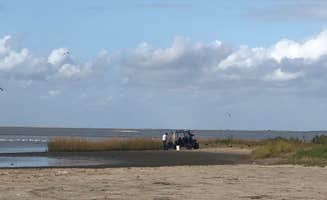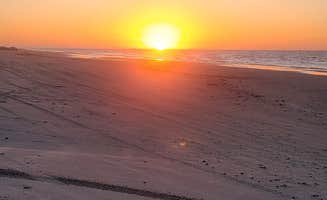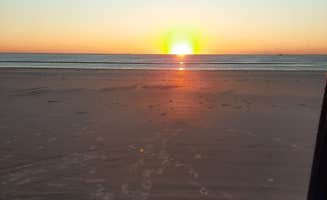Dispersed camping near Anahuac, Texas extends beyond the Bolivar Peninsula to include several inland options. The area experiences subtropical climate conditions with humid summers reaching 90°F and mild winters with temperatures rarely dropping below 45°F. During hurricane season (June through November), weather conditions can change rapidly, requiring campers to monitor forecasts and maintain evacuation readiness.
What to do
Fishing opportunities: The Gulf waters at Bolivar Flats provide excellent fishing without requiring a long trek. Visitors report successful catches directly from the shore, with one camper noting, "Great time fishing here."
Paramotor watching: At Bolivar Flats, the open beach areas attract paramotor enthusiasts who regularly practice over the shoreline. According to one visitor, "There are also paramotors that fly over head, they are fun to watch."
Beachcombing: High Island Beach features extensive shell collecting opportunities. The morning hours after high tide provide the best chance to find intact specimens, especially after stormy conditions churn up new deposits.
What campers like
Isolation on weekdays: Bolivar Flats Dispersed Camping offers significant privacy during weekday visits. One reviewer shared, "We love this beach. It's our third time staying here, and each time it's been quiet, peaceful, and hardly any other campers."
Cell reception: Unlike many primitive camping areas, Bolivar Flats maintains reliable connectivity. A camper confirmed, "We have AT&T and cell service was excellent," making it suitable for remote workers needing to stay connected.
Hard-packed sand: The driving surface at High Island Beach provides stable ground for vehicle access. A visitor explained, "The sand is very hard packed so I wouldn't be too worried about sinking as long as you hug a little closer to the shoreline versus the grass."
What you should know
Beach camping etiquette: Multiple reviews mention concerns about litter at these primitive sites. One camper at Rollover Pass noted its history, explaining, "Rollover Pass, Texas was first used by smugglers that would transfer their loot between the Gulf and Galveston Bay," while emphasizing the importance of Leave No Trace principles.
Weather variability: Weather conditions can change dramatically at these coastal sites. A camper reported, "I was there the night of a tornado watch. 70 mile an hour winds and heavy rain."
Fire safety considerations: When building fires on the beach, extra precautions are necessary due to coastal winds. One visitor advised, "Bring a shovel if you want to start a fire and please be cautious about the winds blowing in. I could very easily see an unsupervised fire causing a devastating event."
Tips for camping with families
Biting insects: Families with children and pets should prepare for coastal insects, particularly in warmer months. A camper at Bolivar Flats shared, "Only gave 4 stars because of the biting flies... They were swarming out dog, we had to keep her in the tent most of the time."
Educational opportunities: The historical significance of Rollover Pass provides learning opportunities. The area got its name because "smugglers that would transfer their loot between the Gulf and Galveston Bay. Their loot was normally packed into the large wooden barrels and they rolled their loot from one side of the bay to the other."
Temperature preparation: Even in seemingly warm seasons, temperatures can fluctuate significantly. A camper at High Island Beach advised, "We went in November so it dropped to 40° in the night; be prepared for colder temperatures."
Tips from RVers
Rig positioning: For RVs at primitive camping sites, positioning relative to the tide and wind direction is crucial. A visitor to Bolivar Flats with a substantial rig reported, "We're about 17k pounds and had no issues driving and setting up on the sand."
Designated RV areas: RVs generally fare better staying closer to established access points. The entry to High Island Beach includes "a parking lot before the beach that's asphalt and seems to be fair game" for larger vehicles concerned about sand driving.
Extended stay considerations: For longer visits, these sites lack services but can accommodate extended camping. One RVer shared their experience: "We spent 2 weeks here during the winter. It's a really quiet spot with a few other RV's here and there in the beach."




